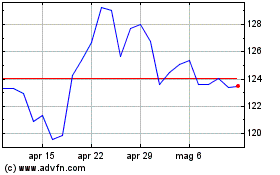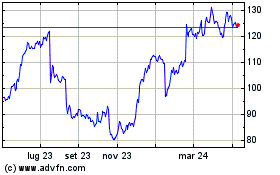UPDATE:Cap One Hit With Downgrades;Concerns On Late-Fee Limits
05 Marzo 2010 - 10:19PM
Dow Jones News
Concerns are growing that the government's tougher stance on
late fees could hit Capital One Financial Corp.'s (COF) bottom line
harder than the other credit card companies.
The credit-card-issuer-turned-bank reaps more income from late
fees than top competitors, as its relatively large customer base of
less creditworthy borrowers tend to fall behind on payments. And
concerns are mounting on Wall Street that the Federal Reserve's
proposal aimed at keeping late fees from exceeding a customer's
minimum payment could dent this income stream.
Goldman Sachs downgraded its Capital One investment rating to
'neutral' from 'buy' on Friday, one day after SunTrust Robinson
Humphrey did the same, with both firms mentioning possible
restrictions on late fees.
A Capital One spokeswoman declined to comment on the downgrades,
citing the company's practice of not commenting on analyst reports.
The company's shares recently traded at $37.93, up 2.96%.
Less creditworthy borrowers make up over 30% of Capital One's
cardholders, according to a Goldman Sachs report Friday, compared
with the more typical 20% to 25% for its competitors.
The company's income from late fees may be as much as double
that of its top competitors, according to some estimates. This
week, Barclays Capital pegged Capital One's late-fee income last
year at somewhere between $600 million and $1.2 billion, compared
with $150 million to $300 million for Discover Financial Services
(DFS) and $526 million for American Express Co. (AXP).
The Fed's proposal appeared to surprise some analysts. "While we
knew that late fees were a topic of interest at the Fed given the
mandate of the Credit Card Act, we previously took a more
optimistic outlook than we believe is reflective in the Fed's
proposed amendment" to laws governing the sector, SunTrust analyst
John W. Stilmar wrote clients Thursday.
The late fee clampdown, assuming it becomes law, would likely
hit Capital One harder than others. SunTrust analysts estimate the
company's annualized earnings per share could drop by 30 to 60
cents assuming the tougher rules become law. The impact on Discover
was viewed as being smaller--around 6 to 10 cents per share, while
the effect on AmEx was judged to be minimal.
Investors have also been concerned about Capital One's shrinking
book of credit-card loans. Capital One shares fell after the
company reported fourth-quarter results in January, even as Capital
One reported a better-than-expected profit of $375.6 million. The
selloff stemmed from concerns that its credit-card profit of $509.9
million came from squirreling away less for potential losses in its
credit-card portfolio rather than a fundamental improvement in its
businesses. Delinquencies and loan defaults, for instance, remained
high in its main operations.
The quality of Capital One's loan book, which is core to its
lending business, hasn't significantly improved yet. In January,
the company wrote off 10.41% of its U.S. credit-card loans, up from
10.14% in December. The write-off rate is annualized. Borrowers at
least a month behind on their credit-card payments rose to 5.80% in
January from 5.78% in December.
In contrast, American Express, which caters to more affluent
borrowers, is exhibiting relatively healthier credit trends. AmEx's
U.S. borrowers at least a month behind their card payments declined
modestly, to 3.6% in January from 3.7% in December. In addition,
AmEx wrote off 7% of its card loans in January, compared to 7.1% in
December.
-By Aparajita Saha-Bubna and Brendan Conway, Dow Jones
Newswires; 617-654-6729; aparajita.saha-bubna@dowjones.com
Grafico Azioni Discover Financial Servi... (NYSE:DFS)
Storico
Da Giu 2024 a Lug 2024

Grafico Azioni Discover Financial Servi... (NYSE:DFS)
Storico
Da Lug 2023 a Lug 2024
